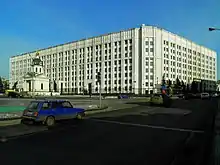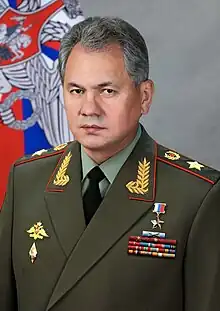| Министерство обороны Российской Федерации | |
.svg.png.webp) Ministry emblem | |
 Ministry flag | |
 General Staff building, the ministry headquarters | |
| Agency overview | |
|---|---|
| Formed | 1717 as College of War |
| Preceding agencies |
|
| Jurisdiction | President of Russia |
| Headquarters | Znamenka 19, Moscow, Russia[1] 55°43′40″N 37°35′22″E / 55.72778°N 37.58944°E |
| Annual budget | US$69.3 billion (2014) |
| Minister responsible | |
| Child agency |
|
| Website | eng |
The Ministry of Defence of the Russian Federation (Russian: Министерство обороны Российской Федерации; MOD) is the governing body of the Russian Armed Forces. The President of Russia is the Commander-in-Chief of the forces and directs the activity of the ministry. The Minister of Defence exercises day-to-day administrative and operational authority over the forces.[2] The General Staff of the Armed Forces executes the instructions and orders of the president and the defence minister.
The ministry is headquartered in the General Staff building, built in 1979–1987 on Arbatskaya Square, near Arbat Street in Moscow. Other buildings of the ministry are located throughout Moscow. The supreme body responsible for the ministry's management and supervision of the Armed Forces and the centralization of the Armed Forces' command is the National Defense Management Center, located in the Main Building of the Ministry of Defense, built in the 1940s on Frunzenskaya Embankment.
The current Minister of Defence is Army General Sergei Shoigu.
History
| Russian Armed Forces |
|---|
.svg.png.webp) |
| Staff |
| Services (vid) |
| Independent troops (rod) |
| Special operations force (sof) |
| Other troops |
| Military districts |
| History of the Russian military |


The U.S. Library of Congress Country Studies' volume for Russia said in July 1996 that:
[The] structure [...] does not imply military subordination to civilian authority in the Western sense [...]. The historical tradition of military command is considerably different in Russia. The tsars were educated as officers, and they regularly wore military uniforms and carried military rank. Stalin always wore a military uniform, and he assumed the title generalissimo. Even General Secretary Leonid I. Brezhnev [...] appointed himself general of the army, and he encouraged portraits of himself in full uniform. By tradition dating back to the tsars, the minister of defense normally is a uniformed officer. The State Duma also seats a large number of deputies who are active-duty military officers—another tradition that began in the Russian imperial era. These combinations of military and civilian authority ensure that military concerns are considered at the highest levels of the Russian government.[3]
In May 1992, President of Russia Boris Yeltsin appointed General of the Army Pavel Grachev to the post of Minister of Defence. Grachev's decision to side with Yeltsin in the Russian constitutional crisis of 1993, when the president called up tanks to shell the Russian White House to blast his opponents out of parliament, effectively deprived the Supreme Soviet of Russia of its nominal an opportunity to overturn the president's authority. At least partly for that reason, Yeltsin retained his defence minister despite intense criticism of Grachev's management of the First Chechen War and the Russian military establishment in general. Finally, Yeltsin's victory in the first round of the 1996 Russian presidential election spurred Yeltsin to dismiss Grachev.
In March 2001, Sergei Ivanov, previously secretary of the Security Council of Russia, was appointed defence minister by President Vladimir Putin, becoming Russia's first non-uniformed civilian defence minister.[4] Putin called the personnel changes in Russia's security structures coinciding with Ivanov's appointment as defence minister "a step toward demilitarizing public life." Putin also stressed Ivanov's responsibility for overseeing military reform as defence minister. What Putin did not emphasise was Ivanov's long service within the KGB and FSB and his then rank of General-Lieutenant within the FSB. Such military and security agency associated men are known as siloviki.
As of 2002 there were four living Marshals of the Soviet Union. Such men are automatically Advisors to the Defence Minister. The Marshals alive at that time were Viktor Kulikov, Vasily Petrov, Sergei Sokolov, a former Minister of Defence of the Soviet Union, and Dmitri Yazov. Yazov was listed by the American analysts Scott and Scott in 2002 as a consultant to the (former 10th) Directorate for International Military Cooperation.[5]
Perhaps the first 'real' non-uniformed Defence Minister was Anatoliy Serdyukov, appointed in February 2007. Serdyukov was a former Tax Minister with little siloviki or military associations beyond his two years' military service.
Structure
The Ministry of Defence is managed by a collegium chaired by the Defence Minister and including the deputy Defence Ministers, heads of Main Defence Ministry and General Staff Directorates, and the commanders of the Joint Strategic Commands/Military Districts, the three Services, and three branches, who together form the principal staff and advisory board of the Minister of Defence.
The executive body of the Ministry of Defence is the General Staff of the Armed Forces of the Russian Federation, which is headed by the Chief of the General Staff. U.S. expert William Odom said in 1998 that 'the Soviet General Staff without the MoD is conceivable, but the MoD without the General Staff is not.'[6] Russian General Staff officers exercise command authority in their own right. In 1996 the General Staff included fifteen main directorates and an undetermined number of operating agencies. The staff is organized by functions, with each directorate and operating agency overseeing a functional area, generally indicated by the organization's title.
Military Thought is the military-theoretical journal of the Ministry of Defence, and Krasnaya Zvezda its daily newspaper.
Structure in 2021
Senior staff in 2021 included:[7]
Minister of Defence:
- Minister of Defence of the Russian Federation – General of the Army Sergei Shoigu (since 6 November 2012)
First Deputy Minister(s) of Defence:
- Chief of the General Staff – First Deputy Minister of Defence of the Russian Federation – General of the Army Valery Gerasimov (since 9 November 2012)
- First Deputy Minister of Defence of the Russian Federation – Active State Advisor of the Russian Federation, 1st Class Ruslan Tsalikov (since 24 December 2015)
Deputy Minister(s) of Defence:
- State Secretary – Deputy Minister of Defence of the Russian Federation – General of the Army (Retired) Nikolay Pankov (since 13 September 2005)
- Deputy Minister of Defence of the Russian Federation (Responsible for Organising Material-Technical Support for the Armed Forces) – Colonel General Mikhail Mizintsev (since 24 September 2022)
- Deputy Minister of Defence of the Russian Federation (Responsible for Organising Financial Support for the Armed Forces) – Active State Advisor of the Russian Federation, 1st Class Tatiana Shevtsova (since 4 August 2010)
- Deputy Minister of Defence of the Russian Federation – Supervisor of the Apparatus of the Ministry of Defence of the Russian Federation – Colonel General Yuriy Sadovenko (since 7 January 2013)
- Deputy Minister of Defence of the Russian Federation (Responsible for the Development of the Technical Basis for the Management System and Information Technology) – General of the Army Pavel Popov (since 7 November 2013)
- Deputy Minister of Defence of the Russian Federation (Responsible for Organising Property Management, Quartering of Troops (Forces), Housing, and Medical Support for the Armed Forces) – Active State Advisor of the Russian Federation, 2nd Class Timur Ivanov (since 23 May 2016)
- Deputy Minister of Defence of the Russian Federation (Responsible for Organising International Military and Military-Technical Cooperation) – Colonel General Alexander Fomin (since 31 January 2017)
- Deputy Minister of Defence of the Russian Federation (Responsible for Organising Military-Technical Support for the Armed Forces) – Active State Councillor of the Russian Federation, 1st Class Aleksey Krivoruchko (since 13 June 2018)
- Deputy Minister of Defence of the Russian Federation (Responsible for Combat Training) – Colonel General Yunus-Bek Yevkurov (since 8 July 2019)
- Deputy Minister of Defence of the Russian Federation – Chief of the Main Directorate for Political-Military Affairs of the Russian Armed Forces – Colonel General Viktor Goremykin (since 28 July 2022)
Entities directly subordinated to the Minister of Defence in August 2012 included:[7]
- MOD Press Service and Information Directorate
- MOD Physical Training Directorate
- MOD Financial Auditing Inspectorate
- MOD Main Military Medical Directorate
- MOD State Order Placement Department
- MOD Property Relations Department
- Expert Center of the MOD Staff
- MOD Administration Directorate
- MOD State Defence Order Facilitation Department
- MOD Department of the State Customer for Capital Construction
- MOD State Architectural-Construction Oversight Department
- MOD Sanatoria-resort Support Department
- MOD Housekeeping Directorate
- MOD State Review/Study Group
- MOD Educational Department
- MOD Legal Department
- MOD Organizational-inspection Department
- MOD Personnel Inspectorate
- MOD Military Inspectorate
- MOD State Technical Oversight Directorate
- MOD Aviation Flight Safety Service
- MOD Nuclear and Radiation Safety Oversight Directorate
- MOD Autotransport Directorate
- MOD Staff Protocol Department
- MOD Armed Force Weapons Turnover Oversight Service
- MOD Main Military Police Directorate
The Office of Inspectors General of the Ministry of Defence was established in 2008, consisting of around thirty retired senior officers. The main task of the office is "to promote the organization of combat and operational training of troops, the construction and further development of the Armed Forces of the Russian Federation, the development of the theory and history of military art, and the education of personnel."[8] It is the successor to the Soviet Armed Forces's Group of Inspectors General, which was dissolved in 1992.[8]
Outline structure 2004
An outline structure of the Ministry of Defence includes the groupings below, but this structure was in transition when it was recorded in 2004, with several deputy minister posts being abolished:[9]
|
|
See also
References
- ↑ RF MOS website www.mil.ru accessed 9 August 2012.
- ↑ Федеральный закон от 31 мая 1996 г. № 61-ФЗ «Об обороне» Archived 2018-08-19 at the Wayback Machine See Article 13, §§ 1, 2.
- ↑ Library of Congress Country Studies Russia, Command Structure Archived 2017-09-21 at the Wayback Machine
- ↑ Peter Finn, Russian Leader Expands Powers of a Possible Successor Archived 2017-10-18 at the Wayback Machine, Washington Post, 16 February 2007.
- ↑ Harriet F. Scott and William Scott, Russian Military Directory 2002, p. 341, citing DS2002-0802.
- ↑ William Eldridge Odom, 'The Collapse of the Soviet Military,' Yale University Press, 1998, ISBN 0-300-08271-1, p. 27.
- 1 2 RF MOD website www.mil.ru accessed 18 August 2019.
- 1 2 Misyura, Vyacheslav (12 February 2018). "Управлению генеральных инспекторов Минобороны России — 60 лет!" (in Russian). Russian Ministry of Defence. Retrieved 8 June 2021.
- ↑ H.F. Scott & William F. Scott, Russian Military Directory 2004, pp. 61–82, 97–116.
- ↑ State Secretary, Deputy Minister of Defence Archived 2008-04-11 at the Wayback Machine, Russian Ministry of Defence, accessed May 2008.
External links
- Official website
 (in Russian and English)
(in Russian and English)
